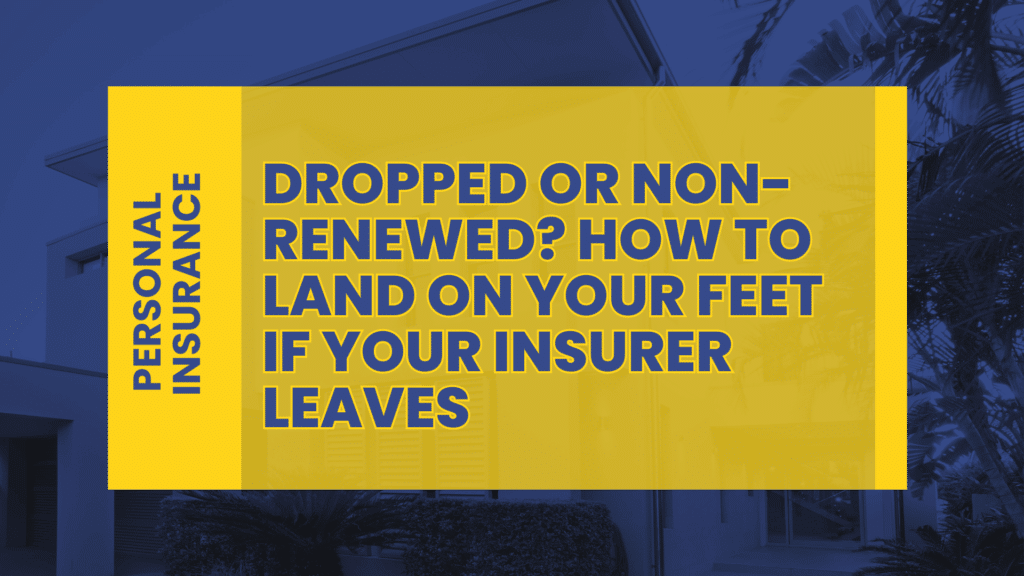-
Main Office: 1434 E. Bloomingdale Ave Valrico, FL 33596-6110
-
Phone: (888) 601-6660
-
Email: info@floridariskpartners.com

Imagine checking your mail and finding a letter from your insurance company—not a renewal notice, but a cancellation. For tens of thousands of Florida homeowners insurers, this isn’t a hypothetical scenario. It’s happening every day.
Insurers across the state are reducing policies, refusing renewals, or pulling out of Florida altogether. If you’ve been dropped, it’s natural to feel frustrated, worried, or even angry. But the good news is: you’re not out of options.
In this guide, we’ll explain why insurers are dropping homeowners, what steps to take immediately, and how to secure new coverage without leaving your family unprotected.
Why Are Florida Homeowners Getting Dropped?
Florida’s property insurance market is in flux. Here’s why cancellations and non-renewals are happening:
Catastrophic Storm Losses
After multiple billion-dollar hurricane seasons, insurers are paying out enormous claims. To manage risk, they often trim their policy base, especially in high-exposure coastal counties.
Rising Reinsurance Costs
Insurance companies must buy their own insurance—called reinsurance—to cover catastrophic losses. Reinsurance costs have surged, and carriers offset that expense by limiting their exposure.
Financial Instability
Several Florida insurers have gone insolvent in the past five years. Others are choosing to exit rather than face potential bankruptcy.
Strict Underwriting Guidelines
Carriers are increasingly strict about roof age, electrical systems, plumbing, and even property location. If your roof is 15–20 years old, for example, your insurer may non-renew regardless of its condition.
The Emotional Impact of a Non-Renewal

Being dropped feels personal, especially if you’ve paid premiums faithfully for years without filing a claim. But remember: cancellations are typically about risk management, not your individual history.
Think of it this way—your insurer is saying, “This property no longer fits our guidelines.” It’s frustrating, but it’s not the end of the road.
Step 1: Don’t Panic—But Don’t Wait
Florida law requires insurers to give advance notice of non-renewal, usually 120 days before the policy expires. That gives you a window to act—but the clock is ticking.
Tip: Start shopping for new coverage as soon as you receive the notice. Waiting until the last minute could leave you scrambling or, worse, uninsured.
Step 2: Contact an Independent Insurance Agent
Independent agencies (like Florida Risk Partners) work with multiple carriers. That means when one insurer drops you, we can quickly pivot to others still writing policies in your area.
Agents also understand carrier appetites—some prefer inland homes, others specialize in coastal risks. A knowledgeable advisor can match you with the right company faster than going it alone.
Step 3: Explore Citizens Insurance
If private options are unavailable, Florida’s Citizens Property Insurance Corporation serves as the “insurer of last resort.” Citizens covers hundreds of thousands of Florida homes and has grown significantly in recent years.
While Citizens has certain restrictions and coverage limits, it ensures no homeowner is left completely without insurance. For many, it’s a temporary lifeline until private market options return.
Step 4: Consider Surplus Lines Carriers
In high-risk cases—like coastal properties or older homes—surplus lines insurers may step in. These companies aren’t subject to the same regulations as admitted carriers, but they can offer coverage when no one else will.
Be aware: surplus lines may cost more and don’t participate in the Florida Insurance Guaranty Association (FIGA), which backs claims if a carrier fails. But they can keep you protected when standard insurers say no.
Step 5: Address Home Features That Raise Red Flags
Sometimes non-renewals are triggered by the condition of your property. Common culprits include:
- Roofs older than 15 years
- Outdated electrical systems
- Old plumbing (polybutylene, galvanized, or cast iron)
- Lack of wind mitigation features
Upgrading these systems can open doors to more carrier options. For example, replacing a 20-year-old roof may feel costly upfront, but it can unlock multiple carriers and premium savings.
Step 6: Review Deductibles and Coverage Carefully

When shopping for replacement coverage, pay attention to:
- Hurricane deductible percentage (often 2–5% of dwelling coverage)
- Roof settlement method (Replacement Cost vs. Actual Cash Value)
- Ordinance or Law coverage (important for code upgrades after storm damage)
- Flood insurance (still excluded from homeowners policies)
Don’t just chase the lowest premium. Make sure your new policy truly protects you when disaster strikes.
Real-Life Example: The Surprise Non-Renewal
Consider John and Maria in Naples. They had insured their home with the same company for over a decade. When their roof reached 18 years old—even though it had no leaks—the insurer sent a non-renewal notice.
Panicked, they called their independent agent, who found them a new policy with another carrier. The premium was slightly higher, but they were covered. They also scheduled a new roof installation, which will make them eligible for lower premiums and wind mitigation credits next year.
The lesson: being dropped isn’t the end of the world—it’s a chance to reassess, upgrade, and sometimes come out ahead.
Common Questions About Being Dropped
“Am I uninsurable now?”
No. It simply means you need to find a carrier whose guidelines fit your property.
“Can my mortgage company force insurance?”
Yes. If you don’t secure coverage, your lender can place force-placed insurance—usually far more expensive and far less comprehensive. Don’t let it get that far.
“What if no private insurer will take me?”
Citizens Property Insurance is designed to cover you when no one else will.
How to Avoid Future Non-Renewals
While you can’t control every factor, you can lower your risk of being dropped by:
- Replacing your roof before it becomes too old for carriers
- Upgrading outdated home systems
- Completing wind mitigation improvements
- Avoiding unnecessary claims
- Working with an agent who stays ahead of market shifts
How Florida Risk Partners Helps Homeowners Get Back on Track
At Florida Risk Partners, we’ve guided countless families through the stress of non-renewals. Our approach includes:
- Immediate market shopping across multiple carriers
- Policy review to ensure coverage gaps are closed
- Advice on home improvements that expand eligibility and reduce premiums
- Flood insurance solutions to complement new policies
- Ongoing monitoring so you’re never caught off guard again
Final Thoughts
Being dropped or non-renewed feels overwhelming, but it doesn’t have to be catastrophic. Florida’s insurance market is tough, but options always exist. By acting quickly, working with an independent agent, and considering upgrades, you can land on your feet and secure solid protection.
Don’t let a non-renewal define your future—use it as a chance to strengthen your coverage and take control.
Call to Action: Contact Florida Risk Partners today for immediate help if you’ve received a non-renewal or cancellation notice. We’ll shop the market, explore Citizens if needed, and make sure you don’t go a single day without coverage.
Call Us Or
Schedule an Appointment
Select an agent below to view our online calendars and select a day and time that works best for you or call us directly at 888-601-6660. When you use our online calendars, you will receive an email with more information.



